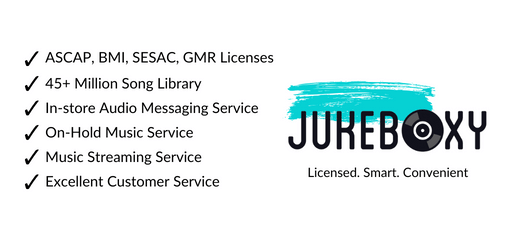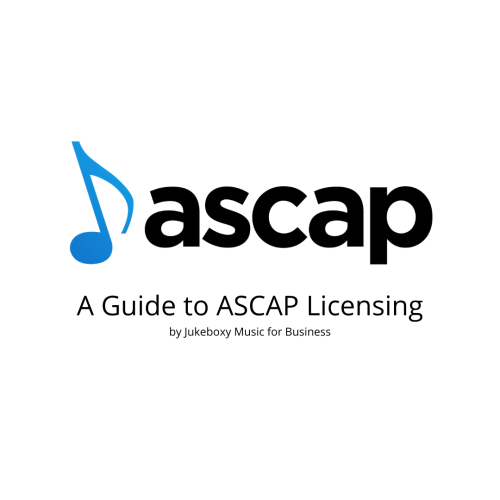
ASCAP vs. BMI vs. SESAC vs. GMR
Have you ever considered having professional background music playing in your establishment? When the right song plays at the right time, it can significantly impact your customers’ behaviors. For that reason, the professional use of background music is becoming increasingly popular in business establishments, such as restaurants, hairdressers, shopping malls, and even in the waiting rooms of doctor’s offices. Music is also an essential part of any business, but one thing is very little talked about. And that is music licensing. This article will explore this topic, looking at what PROs are and the background to music licensing.
Private or Public Music – When is a License Required?
The key finding is that a “private performance” of copyrighted music does not require a license. However, it is one of the most challenging aspects for music copyrights to navigate the difference between a “private” versus a “public” performance when performing music, whether recorded and played or performed live.
“Private performances” are complex and have been the subject of many court cases. Downloading a song from iTunes, or streaming from Spotify, the “performance” rights you receive with the musical work are limited. In particular, it allows an unlimited number of “private performances.” For instance, listening to music on earbuds while running is the equivalent of a private performance. Playing song in your car counts as a private performance as well. However, it can get a little complicated if you decide to go beyond that.
A music performance becomes a public performance when enough people hear the music, and a public performance requires additional licensing fees. The question is: when is a performance no longer private? Music played over a sound system in a public place such as a bar or restaurant is not a private performance. So if you want to play music in a business environment that your colleagues or clients can hear, you’ll need to obtain a business use music license. Many business owners do not take this seriously, or simply do not know about it. They are the ones who will end up paying a fine of tens of thousands of dollars to a music rights organization as a result of their audits.
What are PROs, and Why Should I Know Them?
PROs are organizations that represent artists’ rights, advocate on their behalf and collect royalties for public performances. These types of Organizations are available in almost every country on Earth, and they each represent hundreds of thousands of members. It’s no different in the US.
If you are playing music for commercial purposes at your business, you will need to sign a contract with one or more PROs. Each PRO represents different musical works. If you prefer to have access to an extensive music library, you will need to sign contracts with more than one PRO, possibly with all of them. The following list provides insight into the US music industry’s largest and most well-known PROs. Most PRO members – artists, songwriters, publishers – belong to these organizations, but they only relate to North America.

ASCAP: the American Society of Composers, Authors, and Publishers
ASCAP is among the top PROs in the United States. Founded in 1914 in New York City, ASCAP is the oldest PRO in America and is the second largest, in terms of members, with more than 850,000 songwriters, composers, music publishers, and 14 million songs.
The company is a nonprofit, meaning that it will use any surplus income it earns to improve its service quality instead of going to shareholders. ASCAP has many notable artists in the modern era, such as Justin Timberlake, Ariana Grande, Katy Perry, and Kelly Clarkson.
BMI Music License: Broadcast Music, Inc.
BMI vs ASCAP vs SESAC. Who needs a BMI music license? What is bmi music license? BMI was founded in New York City in 1939 and is a nonprofit business entity like ASCAP. It is the third oldest and largest PRO operating in the United States, registering over 1.2 million publishers, composers, and songwriters. BMI represents over 18.7 million musical works.
Do i need a bmi music license? BMI is the home of several popular contemporary artists, including Lady Gaga, Kendrick Lamar, Taylor Swift, The Red Hot Chili Peppers, and Ed Sheeran. Some older songwriters are or were with the company, including Dolly Parton, Sam Cooke, Willie Nelson, Fats Domino, and John Williams.
SESAC Music License: The Society of European Stage Authors and Composers
Founded in 1930, SESAC music licensing is the third-largest PRO (Performing Rights Organization) operating in the United States. Originally called the Society of European Stage Actors and Composers, it has operated solely under the name SESAC since 1940.
SESAC reached a deal with various artists and currently covers around 400,000 pieces of work by roughly 30,000 writers, which is less than BMI or ASCAP. A few examples of contemporary members who have made a deal with SESAC include Mariah Carey, Adele, and Mumford and Sons. Artists from the old school who worked with the organization SESAC include Bob Dylan, Neil Diamond, Duke Ellington, Count Basie, and Woody Herman.
GMR Music License: Global Music Rights
Founded in 2013, GMR is a relatively new PRO. With just around 48,000 licensed works, the organization has a relatively small client list compared to other North American PROs, with only several hundred songwriters and publishers enrolled.
However, their client list is very high-profile, with artists such as John Mayer, Drake, Harry Styles, Childish Gambino, and Travis Scott. Additionally, they hold the licensing rights to deceased songwriters such as Prince, George Harrison, and John Lennon.
Why Music Licensing Deals With the PROs’ is Problematic?
Different PROs offer different blanket licenses for their respective catalogs of musical works. It is the user’s responsibility to make sure they buy the scorrect license for whatever song they intend to play. Sounds simple, right? Not exactly.
In almost every case, there is no way to know for sure what musical works are included in a PRO’s repertoire. Whenever you want to stream music from major acts like Drake or Bruce Springsteen, you should contact GMR. For Beyonce, on the other hand, you might have to contact ASCAP, BMI, or even both at the same time. Even though most PROs have searchable databases on their websites, they also include disclaimers stating the information may not be accurate. You can find the following statement on their websites:
“no representations or warranties regarding the accuracy or completeness of the information found within the search results.”
As a result of the lack of transparency of who owns what, most venues end up paying thousands of dollars in license fees to all four PROs or face the risk of copyright infringement. For that reason, most business establishments choose not to play song. They feel it is not viable economically to play song due to confusion, costs, and liability concerns.
Although background music is a valuable element for most venues that helps set the mood and create brand recognition, the complexity and risk associated with it outweigh the benefits. Artists, venues, and songwriters all suffer from this phenomenon. The negative impact on enjoying music in the community is undeniable.
Navigating the world of music licensing can be challenging for businesses looking to play music legally in their establishments. When videos or audio featuring works are unilaterally removed due to copyright violations, it often catches businesses off guard, especially if they were unaware of the licensing requirements. Performing rights organizations (PROs) like ASCAP, BMI, SESAC, and GMR play a critical role in managing these licenses, as they represent songwriters and publishers and collect royalties for public performances. If a business fails to secure the necessary licenses, it risks costly fines and potential legal action. Understanding these requirements is essential for ensuring compliance and avoiding disruption.
MUST READ: What is a BMI licensing for businesses, and why do businesses need to comply with Copyright Law?

What is the Alternative?
Fortunately, music streaming providers, such as Jukeboxy Music for Business, have agreements with the PROs to provide a commercial license for their entire music offering. By subscribing to a commercially licensed background music service, you don’t have to sign separate contracts with each PROs.
Every business background music provider is different. They may provide licensed music by all four PROs or less; it is important to check before deciding according to your needs.
Jukeboxy Music subscription, on the other hand, has agreements with all four; ASCAP, BMI, SESAC music licensing, and GMR. Additionally, Jukeboxy has direct contracts with Indie labels. This extensive licensing model gives our customers access to over 45 million song library and professionally curated playlists for all types of businesses.
What are the Advantages of Subscribing to Jukeboxy Music for Business?
Cost savings – obtaining licenses directly from the PROs requires an annual contract. Combined costs start at $2,000 for a small sized business. With Jukeboxy, you can opt for a month-to-month, no-contract subscription at a lower price – $29.99/per month – and save thousands of dollars.
Music streaming technology – Obtaining licenses directly from the PROs is not enough. These licenses give you the right to play track in your establishment only. You will still need a subscription music service to stream quality music that is ad free. Jukeboxy subscription gives you the music repertoire of all the PROs + the music streaming service. You can quickly install the Jukeboxy app and start streaming music legally.
Additional tools for marketing purposes – With a Jukeboxy Music subscription, you will also have access to in-store audio messaging and on-hold music services. Both tools are effective and powerful marketing strategies that increase customer experience and revenues.
Want to learn more about Jukeboxy? You can find more details here: Jukeboxy Music for Business.






